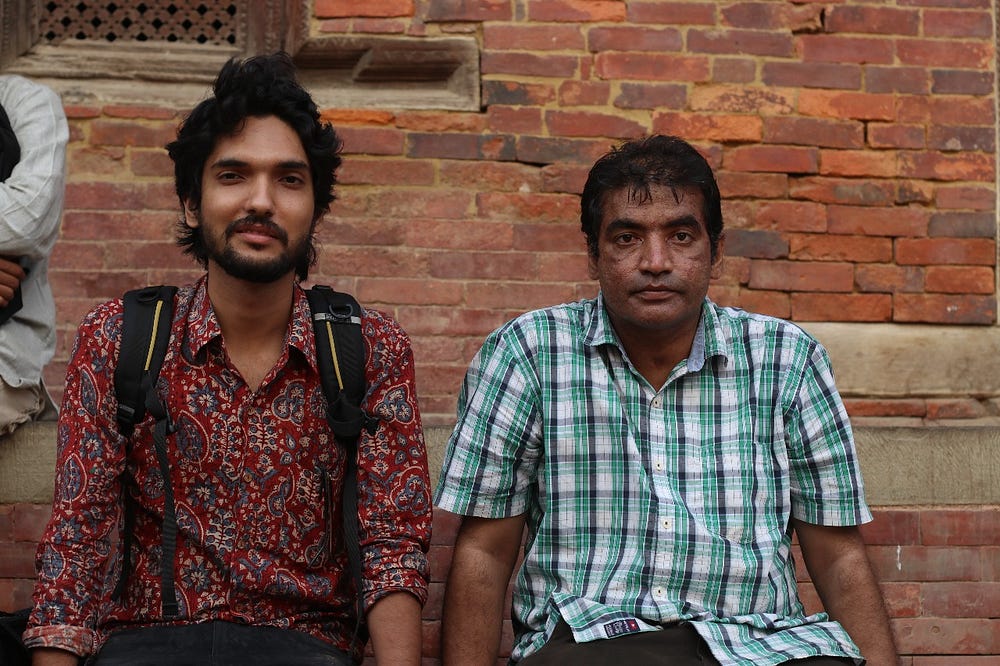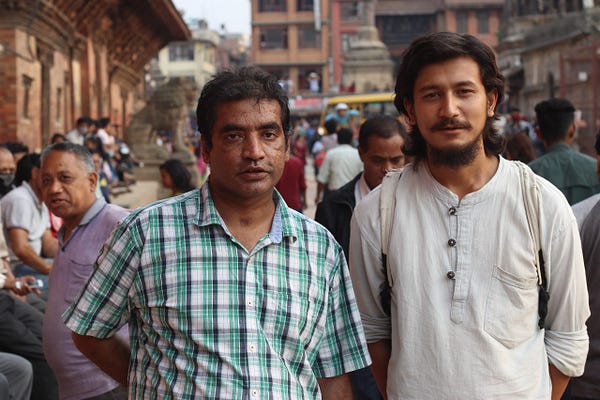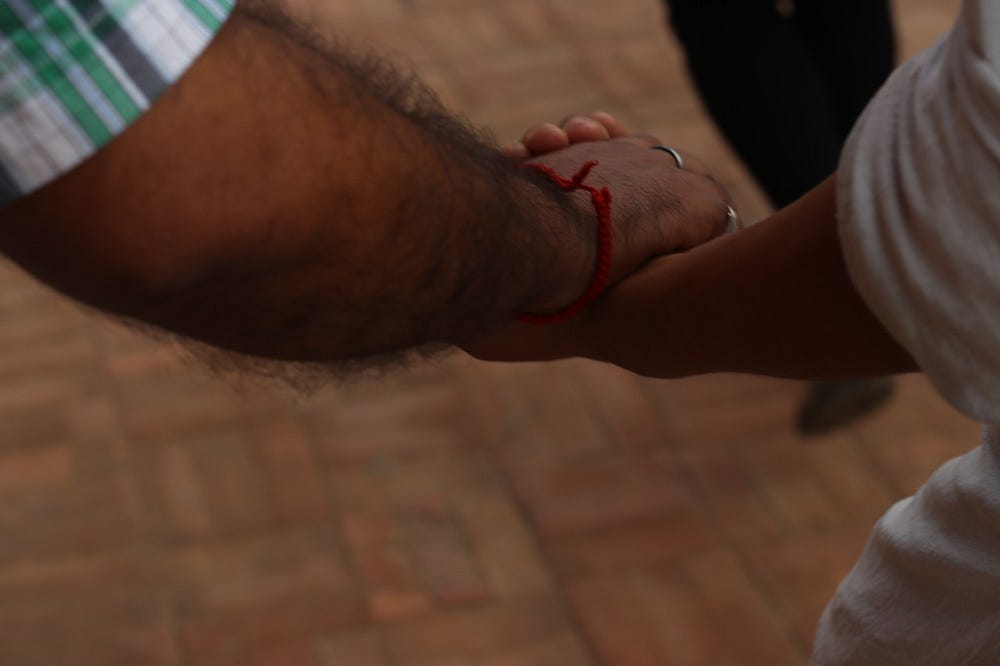Today I met Daulat Jha. Iih had been telling me about someone who became 'Ghajini' (an Indian adaptation of the movie Memento). Iih is a person who'd always make serious stuff sound light. I'll tell you about him later. So, I reached the theater during a practice session in Teku, a place in Kathmandu valley, while Iih waited for me outside. We climb up the building to reach an in-construction theater where some artists were practising. That's when I saw Mr. Jha for the first time. I said a nonchalant 'Hi' and sat next to Iih, keeping him in the middle. In a while Iih asked me to sit next to him and talk, if I wanted to.
I shook hands with him and introduced myself. He then told me his name in a much distorted voice. It took me some time to get used to his voice. When he asked me where I lived, I told him I was staying in Patan. As soon as I told him about myself, he took out his phone and started noting my name, and asked me for its spelling. Then he started noting everything I told him. While he was typing, I was able to peek into the previous notes on his phone. They were about the things he did and people he met along with the time and date. He was trying to maintain a track of everything that was happening.
Daulat Jha used to be a political commentator, a journalist and also a United Nations employee. Apart from this, he also made two short films. In November 2015 he met with an accident which resulted in him becoming ‘mentally handicapped’ as he describes himself in his blog. In technical terms, he is suffering from ‘Diffuse Axonal Brain Injury’ which means he is unable to create memories and keeps forgetting things easily. Recently, his wife also divorced him, which, he writes, was not because of the injury, but was imminent. I got to know more about him through Iih and by reading his blog which has very clear and honest pieces on his life and daily challenges he faces. He is an amazing writer.
oday was one of the few occasions in the last two and a half years since his accident that he went out without his parents. While sitting in the theater, overlooking the practice, he asked me where I lived and what I did. Again. So to understand his situation, I tried asking him memory related questions casually. I asked him what the play rehearsal was about. He said he couldn't remember much but it might be about the giving tree, a very famous story. He was trying to be a part of the group and help them by editing their scripts, something that also contributed to breaking the monotony of his life at home. While sitting there waiting for tea, Iih asked him if he wanted to write a book someday. He said he could write short stories. I suggested him to publish a collection of his blog posts in the form of a book as a lot of people would be interested in knowing about him. I also told him to write something like what ‘Terribly Tiny Tales’ are doing, like extremely short stories so that he will not have to remember the long story line of his own stories. When asked if he wanted to write poetry, he said that he was never able to write poetry as he had too much knowledge about literature. We were throwing in all sorts of questions at him, anything that came in our mind. And he answered each and everything very patiently. We chatted a bit and left for Patan Darbar Square.
He had a limp when he walked and often needed a helping hand on staircase and on undulated surfaces. While on the way down the theatre building, he asked me where I lived. I replied Patan.
He had a limp when he walked and often needed a helping hand on staircase and on undulated surfaces. While on the way down the theatre building, he asked me where I lived. I replied Patan.
WWe reached down and stood at the end of the road. Iih and I, both were at his sides and held his hands to help him cross the road. As soon as he crossed the road, he let go off our hands. I liked that spirit in him. Just imagine yourself not being able to remember things as recent as a person you met 5 minutes ago. If you are not brave enough, the whole world will be scary and just stepping a foot out of the house can make you vulnerable to all kinds of situations.
He hardly smiled. At most, he grinned. Maybe he has not smiled over last few years or maybe he has been like this only, even before the incident.
While walking, Iih continuously asked him if he remembered the streets in which we were. He hardly remembered any. I asked him if he had a friend in Patan with whom we could meet but he had no memory of a friend. He said he might have but it was difficult to remember. Apparently, just yesterday when Iih had met him for the first time, he took him out for a walk and made him meet his old friend. He was touched and thanked Iih.
We had no money left. Daulat ji’s money was only enough for his taxi home. I could not find an ATM to withdraw and Iih hardly ever has money. Still we managed enough for some momos, chai and samosas. Daulat ji drunk a lot of tea and never ate anything. Earlier in the day, when we were on the way to meet him, Iih told me that he keeps forgetting that he already had tea so he asks for another cup every time. I didn't really believe him.
I asked him what was he reading and he said it was some non-fiction book. We suggested him to check out the Dokima book shop, just a few steps away from the restaurant we were eating at. While checking books, he took a few photographs of the books to remember. I am, at the same time, checking books in another corner of the store when I get a call from an unknown number only to know it was him calling me from the other side of the store. Apparently I had dialled my number on his phone earlier as Iih’s phone was off and I had to go out to look for an ATM and meet both of them at a nodal point. Naturally, he had forgotten that.
We walked towards Patan Darbar Square where he would get his taxi back home. On the way, Iih discussed with him the recent political activities in Nepal. He also asked him what he had to say about the UN job. Much to my expectations, he said that he was highly disappointed by it. All of my friends who has worked with or are working with the UN are disappointed. Earlier I felt that there could only be two reasons for it. One that they were actually earning really well and had awesome additional benefits but said otherwise just to neutralize their status among the poor friends like me. Second thing might be that they get really disappointed because of the bureaucracy involved. Listening to Daulat ji, I feel that the latter is truer.
We reached the Darbar Square. By this time he politely said that his feet were aching now. This was the most he had walked in the last few years. We sat in the square for a bit, took some pictures and bid a goodbye with a promise of meeting again. He asked me where I lived. Again. I replied simply, Patan. Iih left me to drop him back home.
While on my way back home, I started thinking about Iih. He has something that I cannot stop admiring. Selflessness and honesty. I was wondering how he was doing something for a stranger without expecting anything out of it. Not even a little expectation. It may happen that Daulat ji even forgets who Iih is by tomorrow. But he never cares about such things. He will go again, and maybe introduce himself to Daulat ji and help him connect with the people outside so he comes out of his monotonous world, again. This is a virtue everyone should learn.
Later that day, I sent him the photographs via email. He really likes receiving emails. I received a reply from him after I sent him the photos. It read like this :
“Thanks a lot, Nipun
He hardly smiled. At most, he grinned. Maybe he has not smiled over last few years or maybe he has been like this only, even before the incident.
While walking, Iih continuously asked him if he remembered the streets in which we were. He hardly remembered any. I asked him if he had a friend in Patan with whom we could meet but he had no memory of a friend. He said he might have but it was difficult to remember. Apparently, just yesterday when Iih had met him for the first time, he took him out for a walk and made him meet his old friend. He was touched and thanked Iih.
We had no money left. Daulat ji’s money was only enough for his taxi home. I could not find an ATM to withdraw and Iih hardly ever has money. Still we managed enough for some momos, chai and samosas. Daulat ji drunk a lot of tea and never ate anything. Earlier in the day, when we were on the way to meet him, Iih told me that he keeps forgetting that he already had tea so he asks for another cup every time. I didn't really believe him.
I asked him what was he reading and he said it was some non-fiction book. We suggested him to check out the Dokima book shop, just a few steps away from the restaurant we were eating at. While checking books, he took a few photographs of the books to remember. I am, at the same time, checking books in another corner of the store when I get a call from an unknown number only to know it was him calling me from the other side of the store. Apparently I had dialled my number on his phone earlier as Iih’s phone was off and I had to go out to look for an ATM and meet both of them at a nodal point. Naturally, he had forgotten that.
We walked towards Patan Darbar Square where he would get his taxi back home. On the way, Iih discussed with him the recent political activities in Nepal. He also asked him what he had to say about the UN job. Much to my expectations, he said that he was highly disappointed by it. All of my friends who has worked with or are working with the UN are disappointed. Earlier I felt that there could only be two reasons for it. One that they were actually earning really well and had awesome additional benefits but said otherwise just to neutralize their status among the poor friends like me. Second thing might be that they get really disappointed because of the bureaucracy involved. Listening to Daulat ji, I feel that the latter is truer.
We reached the Darbar Square. By this time he politely said that his feet were aching now. This was the most he had walked in the last few years. We sat in the square for a bit, took some pictures and bid a goodbye with a promise of meeting again. He asked me where I lived. Again. I replied simply, Patan. Iih left me to drop him back home.
While on my way back home, I started thinking about Iih. He has something that I cannot stop admiring. Selflessness and honesty. I was wondering how he was doing something for a stranger without expecting anything out of it. Not even a little expectation. It may happen that Daulat ji even forgets who Iih is by tomorrow. But he never cares about such things. He will go again, and maybe introduce himself to Daulat ji and help him connect with the people outside so he comes out of his monotonous world, again. This is a virtue everyone should learn.
Later that day, I sent him the photographs via email. He really likes receiving emails. I received a reply from him after I sent him the photos. It read like this :
“Thanks a lot, Nipun
but I forgot all the context…
we saw some play, right? (the giving tree, right?)
at Katha Ghera?
well, I would really appreciate if you emailed me details that I might have as questions
this forgetting stuff really gets annoying
i only remember your face (after looking at the picture)
just pasted my guesses to the answer so I can see what my memory was like at this stage”
If you want to know more about him and his daily life, read Daulat Jha’s blog at: https://daulatjha.wordpress.com
I hope you do.
I hope you do.



Comments